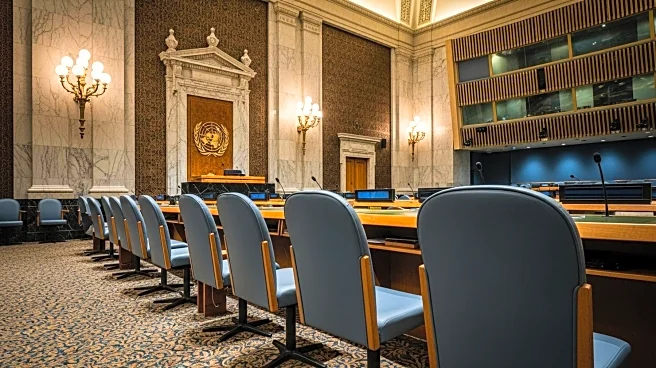What's Happening?
During a session at the United Nations General Assembly in New York, Israeli Prime Minister Benjamin Netanyahu faced a significant protest as scores of delegates from various countries walked out when he approached the podium. This mass walkout occurred amidst Netanyahu's speech, which was expected to address key issues concerning Israel's foreign policy and regional security concerns. The protest highlights ongoing tensions and disagreements between Israel and several member states over its policies and actions in the Middle East. The walkout serves as a symbolic gesture of dissent against Netanyahu's leadership and the Israeli government's stance on various international matters.
Why It's Important?
The walkout by delegates during Netanyahu's speech underscores the deep-seated divisions within the international community regarding Israel's policies, particularly those related to the Palestinian territories and regional security. Such actions at a global forum like the United Nations can influence diplomatic relations and negotiations, potentially affecting Israel's ability to garner support for its initiatives. The protest also reflects broader geopolitical dynamics, where countries express their disapproval of certain policies through symbolic acts. This event may impact Israel's diplomatic engagements and its efforts to address international criticism, affecting its strategic alliances and foreign policy objectives.
What's Next?
Following the walkout, it is likely that diplomatic discussions and negotiations will continue behind the scenes to address the concerns raised by the protesting delegates. Israel may seek to engage with these countries to mitigate tensions and improve bilateral relations. Additionally, the United Nations may witness further debates and resolutions concerning Israel's policies, as member states push for changes or express their positions more formally. The incident could also lead to increased scrutiny of Israel's actions on the international stage, prompting discussions on human rights and regional stability.
Beyond the Headlines
The walkout at the United Nations highlights the complex ethical and political challenges faced by Israel in its international relations. It raises questions about the effectiveness of diplomatic protests and their role in shaping global policy. The event also reflects the broader cultural and ideological divides that influence international diplomacy, where symbolic actions can have lasting impacts on perceptions and policy decisions. As countries navigate these challenges, the role of international organizations in mediating conflicts and fostering dialogue becomes increasingly crucial.











